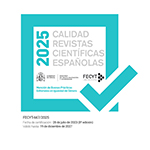El reconocimiento de la pobreza infantil como asunto de Estado
Resumen
España lleva muchos años arrastrando elevadas tasas de pobreza infantil. Desde mediados de la década de los noventa disponemos de datos que evidencian que la concentración de la privación económica en hogares con niños en un país con el nivel de desarrollo que tiene España resulta insólita. Sin embargo, esta situación solo comenzó a problematizarse socialmente a finales de la primera década del siglo XXI, y a colarse en la agenda política bien entrada la segunda década. En la primera parte de este artículo rastreamos la adopción novedosa de políticas en este campo a partir de 2018. En la segunda sección analizamos los distintos factores que propiciaron la problematización pública del fenómeno a nivel internacional y nacional. Examinamos distintas dimensiones relevantes en este proceso: el papel de la agenda política de otros gobiernos y organismos internacionales, la actividad de expertos y académicos y la movilización de las entidades sociales, la intensificación de los daños provocados por la crisis económica que afecta al país entre 2010 y 2014. En la sección final, reflexionamos teóricamente sobre la adopción de las nuevas políticas por parte del gobierno a la luz de distintos marcos analíticos potencialmente explicativos del desarrollo de iniciativas políticas: el “institucionalismo”, la atención a las “comunidades de políticas” y las “ventanas de oportunidad”. Nuestro análisis contribuye a poner de relieve dinámicas de concurrencia e interacción entre factores diversos en el proceso de problematización, entrada en la agenda política y adopción de una nueva política.
Descargas
Descarga artículo
Licencia
La revista Sociedad e Infancias, para fomentar el intercambio global del conocimiento, facilita el acceso sin restricciones a sus contenidos desde el momento de su publicación en la presente edición electrónica, y por eso es una revista de acceso abierto. Los originales publicados en esta revista son propiedad de la Universidad Complutense de Madrid y es obligatorio citar su procedencia en cualquier reproducción total o parcial. Todos los contenidos se distribuyen bajo una licencia de uso y distribución Creative Commons Reconocimiento 4.0 (CC BY 4.0). Esta circunstancia ha de hacerse constar expresamente de esta forma cuando sea necesario. Puede consultar la versión informativa y el texto legal de la licencia.










